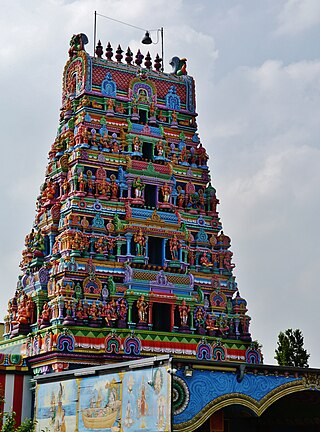Top Qs
Timeline
Chat
Perspective
Hinduism in Germany
From Wikipedia, the free encyclopedia
Remove ads
Hinduism is the fourth-largest religion in Germany. It is practised by around 0.1% of the population of Germany.[1] As of 2017, there were approximately 130,000 Hindus living in the country.[2]
Remove ads
Demographics
From the 1950s, Indian Hindus were migrating to Germany. Since the 1970s, Tamils from Sri Lanka arrived as asylum seekers to Germany (most of them were Hindus). In 2000, there were 90,000 Hindus in Germany.[3] In 2007, there were 6,000 Hindus in Berlin, and in 2009, around 5,000 Hindus lived in Lower Saxony.[4][5]
According to the statistics of REMID,[6] in 2017 there were an estimated 130,000-150,000 Hindus in Germany. About 42,000–45,000 were Sri Lankan Tamils; 60,000–80,000 were Indian; more than 7,500 were from a white and other ethnicities; and some 7,000–10,000 were Afghan Hindus.
Remove ads
Temples
- Sri Muthumariamman Temple
- Britz Blaschkoallee Sri Mayurapathy Murugan Temple
- Sri Kamakshi Amman temple in Hamm
Denominations
ISKCON
The first Hare Krishna temple in Germany was built 1970 in Hamburg. The ISKCON guru Sacinandana Swami translated the Bhagavad Gita into German.[7]
Balinese Hinduism
There are about 700 Balinese Hindu families living in Germany,[8] with the one temple located in Hamburg in front of the Museum of Ethnology, Hamburg and the second, Pura Tri Hita Karana located in Erholungspark Marzahn, Berlin, which is a functioning Hindu temple located in the Balinese Garden of the park and it is one of the few Hindu temples of Balinese architecture built outside Indonesia.[9][10]
Famous German Hindus
- Claudia Ciesla, Bollywood actress.
- Walther Eidlitz, writer, poet, Indologist.
- Hansadutta Swami
- Mother Meera
- Siva Sri Paskarakurukkal
- Mathias Rust
- Sadananda
- Sacinandana Swami
See also
References
External links
Wikiwand - on
Seamless Wikipedia browsing. On steroids.
Remove ads




